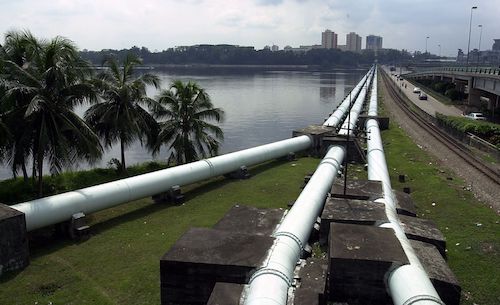We ‘missed’ the chance to revise 1962 Water Pact in 1987

(The Edge) – Water prices in the 1962 Water Agreement can be revised but we had a chance to do that jointly with Singapore in 1987.
The Agreement provided for a price review after 25 years.
However, we were said to have not exercised our right to review the price of water under the agreement in 1987 as we had benefited.
In Singapore Parliament Monday, Minister For Foreign Affairs Dr Vivian Balakrishnan said, “Malaysia has previously acknowledged that they themselves chose not to ask for a review in 1987 because they benefited.”
Dr Balakrishnan noted that the 50 Malaysian sen per 1,000 gallons which Johor is paying “is a fraction of the true cost of treating the water.”
Malaysia, Johor in particular is benefitting from the 1962 water pact as Singapore was said to be “subsidising the price all these while.”
A local media reported Monday that it costs Singapore RM2.40 to treat every 1,000 gallons of water.
By selling it to Malaysia at 50 sen, Singapore is providing a subsidy of RM1.90 per 1,000 gallons.
Having bought treated water, Johor then sells it to its people at RM3.95 per 1,000 gallons, earning a profit of RM3.45 per 1,000 gallons, or RM46 million a year, said the report.
As we chose not to review the water price in 1987, Singapore then took several actions which the republic claimed had also benefited us that included building the Linggiu Dam at the cost of over S$300 million (S$1 = RM2.95).
Dr Balakrishnan said if in 1987 Malaysia had exercised the right to review the price of water, “Singapore might have made quite different investment decisions on developing the Johor River and its water catchment areas.”
“One example is the Linggiu Reservoir,” he noted.
The Minister said in 1990, PUB, a national water agency of Singapore and Johor signed an agreement to construct the Linggiu Dam to increase the yield of the Johor River in order to enable reliable abstraction of PUB’s full entitlement of 250 mgd.
“Johor owns the Linggiu Dam, but Singapore paid for its construction and continues to pay for its operation.
“These sums incurred are on top of the RM320 million (S$208 million at 1990 rates) that we paid to Johor in 1990 as compensation for the land used for the Linggiu Reservoir project and for the potential loss of revenue from logging activities, and as a one-time payment for the lease of that land for the remaining tenure of the the Agreement,” said Dr Balakrishnan.
Johor and Singapore signed two long-term Water Agreements whereby the first was signed in 1961 and expired in August 2011.
According to the Singapore Ministry of Foreign Affairs’ website, under the first Agreement, the republic was entitled to draw “an unrestricted quantity of raw water from the Tebrau and Scudai (rpt Scudai) Rivers.”
In return, the agreement stipulated that Singapore would provide Johor with treated water amounting to 12% of the water that it had imported.
When the 1961 Water Agreement expired on Aug 31, 2011, Singapore handed the Johor State government the Gunong Pulai and Scudai waterworks as well as the pump houses at Pontian and Tebrau which it had been operating and maintaining at its own cost.
These facilities were handed to them free of charge and in good working order, it said.
The second Water Agreement was signed in 1962 and will expire in 2061.
It entitles Singapore to draw and use the water from the Johor River up to a maximum of 250 million gallons of raw water per day.
In return, Singapore provides Johor with treated water up to 2% of the water it imports.
PUB draws water from the Johor River and treats the water at the Johor River Waterworks located near Kota Tinggi in Johor.
Over the years, PUB has, at Johor’s request, supplied additional potable water to Johor, including during periods of severe and prolonged drought in Johor.
The additional potable water is supplied to Johor on a goodwill basis and without prejudice to Singapore rights under the 1962 Water Agreement, said the website.

